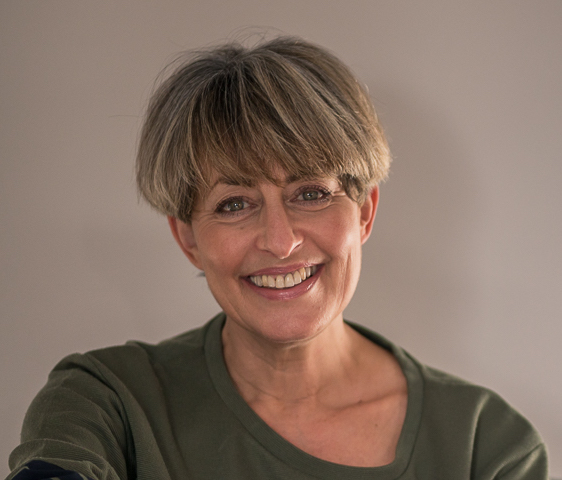Anthony Gormley, our greatest living sculptor's new exhibition
I do realise saying that Anthony Gormley is Britain’s greatest living sculptor is a matter of supremely personal opinion, but honestly if you have ever seen any of his work - and there are so many places where that has been, and is possible to do - I defy you to come up with a reason why he doesn’t deserve that accolade.
Anthony Gormley’s signature body cast sculptures apparently defying gravity in his new Royal Academy show
I first ‘discovered’ him at the Tate in St Ives one wet summer day over 20 years ago when I was on holiday there with my girls, then not yet teenagers, and desperate for something to do that distracted them from the temptation of spending yet more money on yet more tat. And what a distraction it turned out to be.
The exhibits, which included the outline of his body apparently chewed out of stacked slices of white bread, a room entirely filled with thousands of small clay figures and what I now know to be his signature body casts, sprawled, curled and splayed across the floor of a gallery with a mezzanine viewing level, looking for all the world as if they’d been randomly thrown there, made a lasting impression on all three of us.
Mother’s Pride V, a version of the sculpture I saw at the Tate in St Ives when I first discovered Gormley’s work
Over the years since I’ve seen some his extraordinary output of work in so many different settings. On the rooftops of London, on a mile-long swathe of beach in Crosby, in a stairwell in St Paul’s Cathedral and from trains (but not yet, sadly, up close) on a hill outside Gateshead and in so many different galleries large and small. Even, envy-makingly memorably in someone’s garden. I could also have seen them in international venues from Italy to Sweden, Australia to China and the USA.
Now he’s become the latest artist to take over the main galleries at the Royal Academy in London in a bold, ambitious and brilliant exhibition that combines old works with new pieces specially created and built to fill, (and boy do a couple of them really, really fill) the different spaces.
Iron Baby is the first of the Gormley sculptures you encounter as you enter the courtyard at the Royal Academy. It’s deliberately easy to miss
As with all his work, Gormley is focused on the human body and how it relates to the space around and within it. In his own words he wants us to consider: “How do we treat the body not as a given, not as appearance, but as the place that we each find ourselves in?”
The encounters visitors have with the exhibits - from a tiny iron cast of a six-week old baby huddled on the ground in the large entrance courtyard to the Academy (see pic above), to the giant interwoven labyrinth of soldered steel cables suspended from the ceiling of the largest interior gallery - are provocative, enthralling, unsettling and challenging.
Matrix III is a gigantic suspended steel mesh labyrinth that Gormley designed especially for the largest of the Royal Academy galleries
Do you really have to move and clamber through the coils of square section aluminium tubes that entirely fill one of the other galleries like a child’s enthusiastic scribblings? (answer, yes).
Gormley describes the mass of coiled aluminium tube that makes up Clearing VII as ‘drawing in space’
How on earth are those life-size iron cast bodies suspended from the walls and ceilings of another gallery? (see first pic and answer, no idea). And can you really walk inside the vast, seemingly randomly piled together rolled steel cubes that turn out to be a giant, hollow human form crouched on its side? (answer, yes again)
A section of the exterior of the vast Cave 2019 installation which it’s possible to see only from the diagram in the exhibition guide is a body crouched on its side
This is what it looks like in the hollow interior (the woman in the picture was drawing the magical interplay of light and shadow on the beautiful geometric sections of the sculpture)
As with all Gormley’s work, words can only do partial justice to the experience of seeing them for yourself. This epic exhibition at the Royal Academy, which also includes a fascinating collection of his paintings and drawings, runs until December 3rd and you can book tickets on their website. Do it now.
The sketches and paintings on display are a fascinating insight into Gormley’s creative process
But if you can’t make it to London (and I really hope I’ve persuaded you it’s worth making the trip), you don’t have to miss out. Gormley’s monumental Angel of the North , arguably the UK’s most famous piece of sculpture, with it’s big-as-a-jumbo-jet wingspan, dominates the skyline for miles around the north eastern city of Gateshead.
Find out exactly where it is and how to get there by clicking here.
Gormley’s famous Angel of the North dominates the surrounding skyline
As dramatic and unexpectedly affecting is the Gormley installation on Crosby beach. Another Place consists of 100 of his signature cast-iron, life-size figures dotted along a three kilometre stretch of this huge northwestern beach. The figures, all apparently gazing at the far horizon, are placed randomly from the land edge of the beach to a kilometre out to sea, which means that at high tide a proportion of them are entirely submerged beneath the waves.
Remarkable to view at any time (the installation was originally only supposed to be temporary but the local population petitioned for it to be made permanent), it takes on heightened power as the tide is coming in. Watching the figures being slowly swallowed by the sea is both mesmerising and surprisingly distressing.
Gazing out to the horizon, some of the 100 figures that comprise Another Place are submerged by the sea at high tide.
Click here for information on how to get to Crosby beach. Do try to go when the tide is coming in if you can.
I’d love to know if you’ve ever seen any of Anthony Gormley’s work and if so, where was it and what did you think of it?
Other posts you’ll enjoy
Another fantastic exhibition to see in London
Artists interpretations on the subject of ageing
A pair of impressively creative Heydayers














